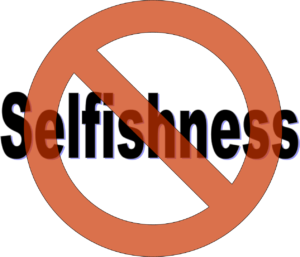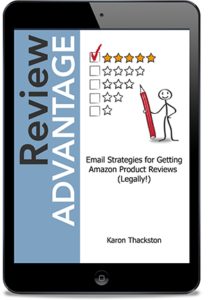By now I hope you know just how important it is to follow all of Amazon’s rules. Breaking too many Amazon guidelines could easily get your seller account suspended. Recently Amazon has updated how sellers can communicate with their customers, and I want to make sure you know about how to correctly go about these customer communications – especially when it comes to requesting feedback on a product you just sold.
No longer are sellers allowed to give away free or reduced priced items in order to get an “honest review” for the product they are selling (unless you are part of the Amazon Vine program which participants join by invitation only). So without being able to incentivize people to leave reviews, how is a seller able to get more reviews for their products on Amazon?

To find the answer I decided to interview an expert on this topic, Karon Thackston of Marketing Words. You might remember Karon doing a few guest posts here on the Full-Time FBA blog when she wrote about 5 Little-Known Facts About Keywords & Amazon Product Listings That Could Hinder Your Success and also her article on The 3 Most Common (And Wasteful!) Mistakes Sellers Make With Their Amazon Listings.
Karon is a genius when it comes to using the right words to get the results you want. When it comes to getting a product review, she has the best advice on which words to use to get that amazing 5-star review! She recently released a book on the topic called Review Advantage: Email Strategies For Getting Amazon Product Reviews (Legally!). I’ve read the book and have already updated my own product review strategies based on the wisdom within the pages.
Ok, enough from me… let’s get to my interview with Karon Thackston!
![]()
STEPHEN: Karon, I gain so many insights and action steps in every book of yours that I’ve read so far. What inspired you to create a book about writing Amazon product review emails?
KARON: This was a project that I had pushed to the back burner for some time. I started working on it several months ago and finished it up just about the time Amazon yanked the incentivized review policy. (Good timing, huh?)
I never liked the typical, ordinary review request template that practically every Amazon seller uses now. I’d done some research and found that these emails really didn’t work very well, either. Plus, because virtually every seller was sending the exact same thing (with perhaps a few minor tweaks), customers typically were either annoyed by the emails and/or ignored them completely because they’d seen the same thing from a ton of other sellers.
The Marketing Words’ team has written after-purchase review emails for many of our clients over the years. Some have actually gotten thank-you notes from Amazon shoppers about the quality and content of the follow-up emails, so we know that customers appreciate this new style.
STEPHEN: You mentioned that the “typical, ordinary” review template was overused. Is that the only thing that’s wrong with it?
 KARON: Isn’t that enough? It’s hard enough to motivate customers to leave product reviews. After all, they are busy people. Stopping and trying to think of what to say is just not at the top of their priority list. If sellers fill customers’ inboxes with the same old thing, those customers will just swipe or click “Delete” and never think twice about it.
KARON: Isn’t that enough? It’s hard enough to motivate customers to leave product reviews. After all, they are busy people. Stopping and trying to think of what to say is just not at the top of their priority list. If sellers fill customers’ inboxes with the same old thing, those customers will just swipe or click “Delete” and never think twice about it.
The frequency of these emails is also a problem. You can find thread after thread in the Amazon forums from customers screaming about getting so many follow-up emails that they actually contact Amazon to be removed from sellers’ emails. Or (worse) they leave negative reviews on product pages just because they are ticked off about getting 5, 7, 10 post-purchase messages.
Somehow, I believe that many Amazon sellers have been told by some Internet marketer that this is the way it should be. But we’re talking about selling physical products on an ecommerce platform, not selling video training series or ebooks on a private website. The copywriting, marketing, and lead-generation tactics are not even close to being the same.
While you might send a multi-part follow-up email series to someone who buys an ebook from you via your own website, that doesn’t mean this approach will work on Amazon. Not only is it against the terms of service (TOS), it may very well cause you to lose customers.
STEPHEN: That totally makes sense. In light of this, what are some of the biggest mistakes people make when they write product review emails?
 KARON: The #1 mistake is having an it’s-all-about-me mindset. The vast majority of follow-up emails mention that the customer can contact the seller with questions or issues. The overall message, however, is, “Hey, customer … here’s what you can do for me. Leave a review so I can sell more stuff.” Turning your focus goes a long way to showing the shopper that you really want to offer something useful and improve their experience even after the sale.
KARON: The #1 mistake is having an it’s-all-about-me mindset. The vast majority of follow-up emails mention that the customer can contact the seller with questions or issues. The overall message, however, is, “Hey, customer … here’s what you can do for me. Leave a review so I can sell more stuff.” Turning your focus goes a long way to showing the shopper that you really want to offer something useful and improve their experience even after the sale.
The second mistake is including elements in the emails that may very well get your account suspended or banned. Amazon has really cracked down on this lately and you can see horror stories all over the Net from sellers who got taken down with full force.
Putting links to ANY website (including to Amazon product pages, YouTube videos, webpages where customers can download bonus ebooks, etc.) is just one common practice that has never been allowed. The one exception is adding a link to the page where buyers can leave a review. Amazon is taking action against many of these sellers because their email system has been flooded since the change in their incentivized review policy. They want to make certain they don’t end up with another bucketful of rule breakers who will damage their reputation and cause shoppers not to want to buy from Amazon.
STEPHEN: Nobody wants their account suspended, but many never seem to read the Amazon guidelines to make sure they’re following all the rules. Thanks for showing us how our mistakes might end up getting us suspended. So, based on your experience, what is the one thing you wish Amazon sellers understood better about product reviews?
 KARON: That getting reviews can be a slow process, but they shouldn’t give up.
KARON: That getting reviews can be a slow process, but they shouldn’t give up.
Only a small percentage of shoppers (on Amazon or anywhere else) will go to the trouble of leaving a product review. Depending on what statistics you believe, that number is somewhere between 5% and 20%. So, even on your best day, 80% to 95% of your customers will probably not leave a review. (Of course, there are exceptions.)
Does that mean you should not even try to get reviews? Absolutely not! Reviews are vital to a product’s success. I can tell you, as an avid Amazon shopper, reviews play a huge role in my buying decisions. Most shoppers feel the same way. They want to alleviate the fear of the unknown and reinforce their choice to buy a particular product.
One thing is certain — most shoppers will not voluntarily go back to a site and leave a review without being prompted. Life gets busy and reviews are not something most people put high on their to-do lists.
Sending an email or two that offers something valuable, that puts the customer first, and that offers assistance to the buyer goes a long way toward enticing people to leave reviews when they otherwise would not.
STEPHEN: I know that’s so true because I almost never leave a product feedback when all the seller does is ask me for a review. I know that getting product reviews is important, but in your opinion, what are the biggest benefits of gaining more product reviews on an Amazon product page?
 KARON: Sales, pure and simple. Reviews work to reassure shoppers that others have bought and everything turned out OK. They offer social proof that people (just like them) thought this product was worthy buying and — lo and behold — it was!
KARON: Sales, pure and simple. Reviews work to reassure shoppers that others have bought and everything turned out OK. They offer social proof that people (just like them) thought this product was worthy buying and — lo and behold — it was!
What’s more, once you get a stockpile of reviews, the sheer quantity lends itself to the longevity of your product. It takes a while to rack up hundreds or thousands of reviews, and customers understand that this likely means your product has been around a while. Getting more reviews also generates more trust in your product. That, in turn, makes shoppers feel more at ease about purchasing what you’re selling.
Reassurance + Social Proof + Longevity + Trust = More Sales
 STEPHEN: Thank you so much for hanging out with us and answering my questions. Before I let you go, what’s the name of your ebook and where can we find it?
STEPHEN: Thank you so much for hanging out with us and answering my questions. Before I let you go, what’s the name of your ebook and where can we find it?
KARON: It’s called “Review Advantage: Email Strategies for Getting Amazon Product Reviews (Legally!).” It shows you the new way to create follow-up emails that customers actually appreciate and respond to. Just follow the link above and you’ll find it. Plus, if you use coupon code review10 (case sensitive) you will save $10!
STEPHEN: Thanks again, Karon! I appreciate your time and insight into this important aspect of selling on Amazon.
![]()
What about you? Did you know how important getting product reviews were to increasing your sales? What strategies have you used in order to get more product reviews? Leave your comments or questions below.

Great blog Stephen and Karon. Thanks for sharing your knowledge.
You bet! Glad you got a lot from it.
Thanks! As a NEW seller and – one that wants to build real trust with my customers (I have plenty of time to build a business I can use as my livelihood) – your wisdom is welcome.
Thanks!
Awesome post Stephen.
Karon is great.
As a frequent Amazon buyer i can tell you, emails i get are not interesting enough to even read the first line. And i study emails professionally.
So imagine a regular buyer.
I’ve read Review Advantage 5 times and it’s pure gold.
Thanks Ivelin! You are very kind 🙂
Great post for a new seller, thanks Stephen! Does this mean that we shouldn’t use Feedback Genius to request those seller feedback comments or is it to think more about the content of the email request? I am still learning so much and want to get started on the right foot.
You can definitely use Feedback Genius to automate product reviews…. That’s what I use. Get an extra month of Feedback Genius FREE with this link: https://www.fulltimefba.com/genius with coupon code fulltime. In fact, our next blog post is on this very topic!
You can certainly request a review. Don’t hound people, but yes… request a review. Feedback Genius is a great tool to use.
Thank you for putting together this post Stephen, great ideas. Angela’s question above asked about using Feedback Genius for seller feedback rather than product reviews. Do you ask Amazon customers for seller feedback? And if so, do you use Feedback Genius for seller feedback requests?
I’m curious about this too! Also, how/where do I go to send an email to thank the customer for purchasing? Or do you do that when you request seller feedback? TIA!
Yes, I use Feedback Genius for BOTH seller feedback AND product feedback. It’s perfect for both!
Thank you Stephen for clearing that up. Appreciate your help!!
WOW!
Thanks, Stephen!
Great post for a new seller.